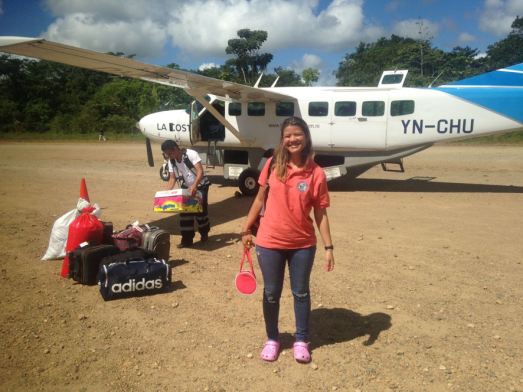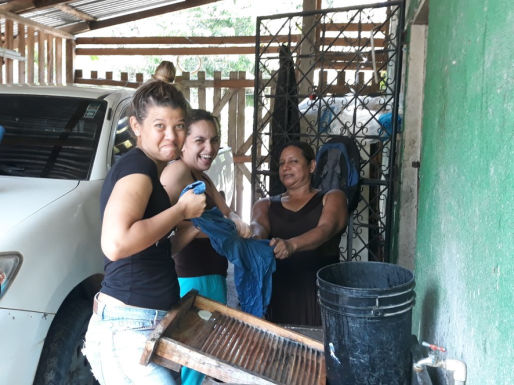
When I arrived in the Republic of Nicaragua I found everything very different from Brazil, but I decided to open myself up to new experiences. Without creating expectations, I tried to accept this new country into my life. I chose to prepare myself for the “non-knowledge” of things. I opened myself to the new culture, the new place, and all the POSSIBILITIES that presented themselves to me while I watched everything carefully.
I came curious to work together with an NGO that works on issues of social justice, community development, and health, so after GMF training and training in the capital of the country, I went to the Caribbean Coast and started a cultural immersion that would change my life!

The Autonomous Region of the North Caribbean of Nicaragua is very interesting and fun. Interesting because it is everything different from what I already knew, and fun because that is how I see my learning process and adaptation! I love meeting people, and my biggest investments have been directed to new relationships I’ve made.
Even though sometimes people look at me as if I’m from another planet, it’s fun! Once I was accompanied by my friend from work and a very humble lady asked my Nicaraguan friend, “What country is she from?” I looked at her and answered in Spanish: “I’m from Brazil!” I smiled, but that lady was very embarrassed because I spoke to her without knowing her. After I said my name, she already gained more confidence and continued asking questions!
In Brazil I have always loved going out for a walk and having coffee outside the house every day; this is something important for me. However, in my place of work it is impractical, so I have reorganized my lifestyle. Now I like to make homemade coffee, wash clothes by hand with a specific soap whose smell I love, do exercises in the workshop room of my work (where I live), and sit on the porch talking to a work friend! I rewrite Bible passages and study my actions together with some friends of my GMF class! This is good!

We are all beings that adapt, and I can say that I am very happy to live as I live and to meet so many nice people. The important thing in all of this is to be well and have fun even in a complex context. I choose to smile every day in the midst of my sadness, and it makes me grow a little stronger.
My gratitude is for being able to do what I learned to enjoy. I continue to learn how to be, how to learn, and how to do. My learning is constant, and in Christ I can say with great confidence: everything is fine!

Ester Antunes
GMF International, Class of 2017-2019
Nicaragua
Possibilidades, elas estão onde você nem imagina!
Quando cheguei na Republica da Nicarágua achei tudo muito diferente do Brasil, mas decidi me abrir para as novas experiências e sem criar expectativas busquei aceitar esse novo país na minha vida. Escolhi me preparar para o “não conhecimento” das coisas, me abri para a nova cultura, o novo lugar e todas as POSSIBILIDADES que se apresentavam à mim enquanto eu observava tudo atentamente.
Cheguei curiosa para trabalhar junto com uma ONG que atua em questões de justiça social, desenvolvimento comunitário e saúde, então após capacitações e treinamentos na Capital do país, fui a Costa do Caribe e comecei uma imersão cultural que mudaria minha vida!
A Região Autônoma do Caribe Norte da Nicarágua é muito interessante e divertida, interessante porque é tudo diferente do que eu já conhecia e divertida porque é assim que eu enxergo o meu processo de aprendizagem e adaptação! Eu amo conhecer pessoas e meus maiores investimentos foram direcionados a novos relacionamentos que fiz, mesmo que as vezes as pessoas me olhem como se eu fosse de outro planeta, é divertido! Uma vez eu estava acompanhada com minha amiga de trabalho e uma senhora muito humilde perguntou a minha amiga nicaraguense: de que país ela é? Olhei para ela e respondi em espanhol: Sou do Brasil! Eu sorri, mas aquela senhora ficou muito envergonhada por que eu falei com ela mesmo sem a conhecer, após dizer meu nome ela já ganhou mais confiança e seguiu fazendo perguntas!
Sempre amei sair para passear e tomar café fora de casa todos os dias, isso é algo importante para mim, mas no meu local de atuação é inviável então eu readequei meu processo de qualidade de vida e agora gosto de fazer café artesanal em casa, lavar roupas na mão com um sabão específico que eu amo o cheiro, fazer exercícios na sala da oficina do meu trabalho( onde eu moro) e sentar na varanda para conversar com uma amiga de trabalho! Reescrevo passagens bíblicas e estudo minhas ações juntamente com alguns amigos de minha turma GMF! Todos nós somos seres que se adaptam e posso dizer que estou muito contente de viver como vivo e conhecer tantas pessoas legais, o importante em tudo isso é estar bem e se divertir mesmo em um contexto complexo, eu escolhi sorrir para a tristeza todos os dias, e ela me faz crescer um pouco mais forte.
Minha gratidão é por poder fazer o que eu aprendi a gostar, sigo aprendendo a ser, aprender, fazer e ser, minha aprendizagem é constante e em Cristo eu posso afirmar com muito consciência: vai tudo bem!

















